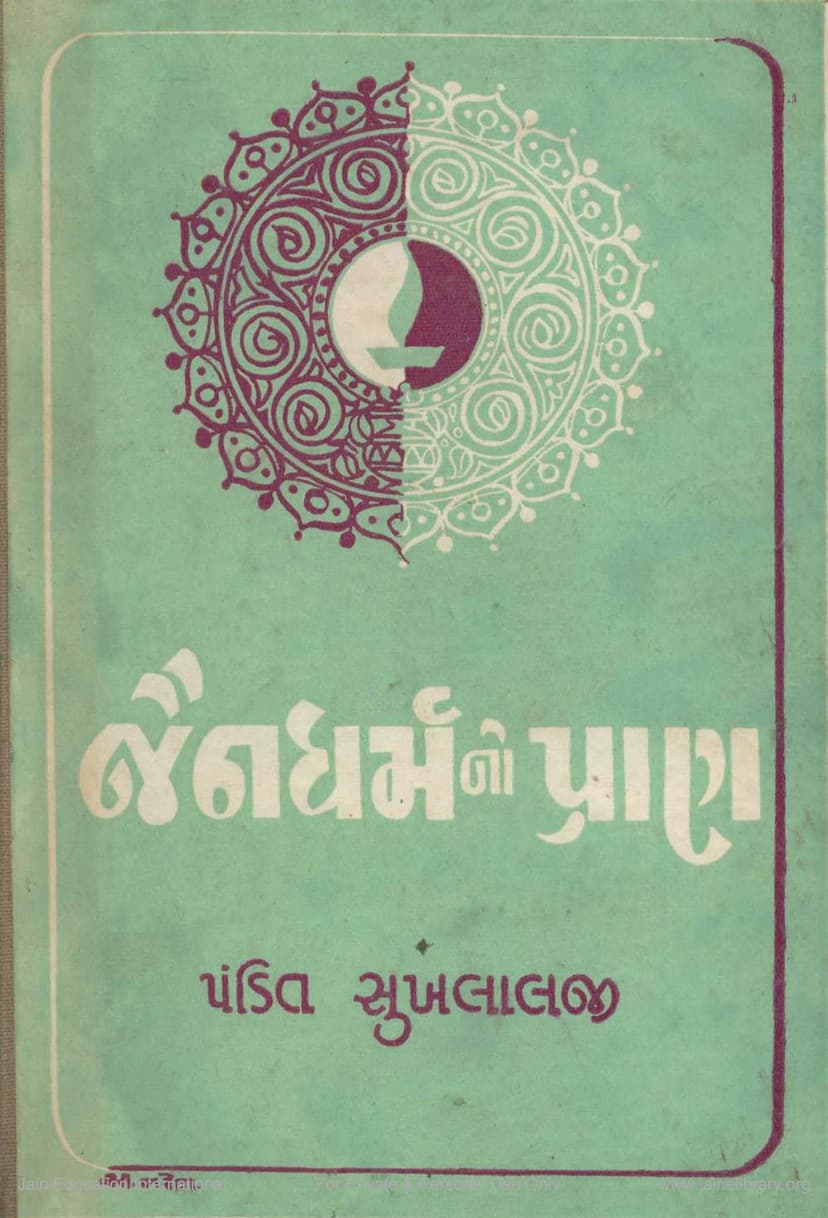Jain Dharmano Pran
Added to library: September 2, 2025

Summary
Here's a comprehensive summary in English of the Jain text "Jain Dharmano Pran":
Book Title: Jain Dharmano Pran (The Essence/Soul of Jainism) Author(s): Pandit Sukhlal Sanghavi, Dalsukh Malvania, Ratilal D Desai Publisher: Rasiklal Dahyabhai Kora, Mumbai Catalog Link: https://jainqq.org/explore/002157/1
This book, "Jain Dharmano Pran," is a collection of essays by the esteemed Jain scholar Pandit Sukhlal Sanghavi, expertly compiled and edited by Dalsukh Malvania and Ratilal Jaychand Desai. It is dedicated to the memory of Shri Jagmohanlal Kora and published as part of a memorial book series.
The book delves deeply into the fundamental principles and essence of Jainism, aiming to provide readers with a profound understanding of its core tenets. It explores various facets of Jain philosophy, culture, and practice, highlighting their unique contributions and relevance.
Key Themes and Content:
-
The Essence of Religion (Dharma): The introductory sections emphasize that true religion (Dharma) is not merely about rituals or external practices, but about the inner purification of the self, the cultivation of virtues like truth, non-violence, non-possession, and the development of equanimity and wisdom. It stresses the importance of intellectual honesty and fearlessness in the pursuit of truth.
-
Jainism's Unique Philosophy: The book elaborates on the distinctiveness of Jain philosophy compared to other Indian systems. It highlights Jainism's emphasis on Ahimsa (non-violence) as the paramount principle, permeating all aspects of thought and action, extending even to the subtlest forms of life. It also extensively discusses Anekantavada (the doctrine of manifold aspects), explaining how it fosters a tolerant and comprehensive worldview by acknowledging multiple perspectives and avoiding dogmatic absolutism. The philosophical concepts of Syadvada (the doctrine of conditional predication) and Nayavada (the theory of standpoints) are presented as tools for understanding reality from various angles, thereby preventing rigid, one-sided views.
-
The Role of Tirthankaras: The text discusses the significance of the Tirthankaras, particularly the 24 Tirthankaras of this era, from Rishabhdev to Mahavir. It clarifies that they are not divine incarnations but human beings who, through intense spiritual practice and self-realization, attained supreme spiritual status and guided humanity. Their teachings emphasize human potential and self-reliance.
-
Jain Culture and Way of Life: The book explores the cultural expressions of Jainism, including its emphasis on the ascetic ideal (Nivartak Dharma) alongside the householder's life (Pravartak Dharma). It touches upon the importance of rituals like Aavashyak Kriya (six essential daily duties) and Upayukta Yogas (various forms of spiritual practice). The concept of Tapa (asceticism) and Parishaha (endurance of hardships) is presented as crucial for spiritual progress.
-
Core Principles:
- Ahimsa (Non-violence): Presented not just as an external action but as an inner state of mind, free from malice, anger, and possessiveness. It's emphasized as the foundation for all other virtues.
- Anekantavada (Non-absolutism): Explains the idea that reality is complex and can be viewed from multiple standpoints, promoting tolerance and understanding.
- Aparigraha (Non-possession): The principle of renouncing excessive attachment to material possessions and worldly pleasures.
- Brahmacharya (Celibacy/Chastity): Discussed in detail, emphasizing its role in spiritual discipline and control over desires.
- Karma Philosophy: The text delves into the intricate workings of karma, explaining how actions (karma) shape one's present and future lives, and how liberation (moksha) is achieved by exhausting and preventing the influx of new karma.
-
Spiritual Progress: The concept of Guna Sthanas (stages of spiritual development) is explained, outlining the gradual journey of the soul towards liberation. The text also touches upon the importance of Samayika (equanimity) and Dhyana (meditation) in achieving spiritual growth.
-
Social and Cultural Impact: The book highlights how Jain principles, particularly Ahimsa and Anekantavada, have influenced Indian society and culture, leading to practices like vegetarianism, the establishment of animal shelters (Panjarapole), and a general inclination towards tolerance and ethical conduct.
-
Historical Context: It provides historical insights into the development of Jainism, its relationship with other contemporary traditions like Buddhism, and the contributions of various scholars and reformers. The evolution of practices and doctrines over time is also touched upon.
Overall Message:
"Jain Dharmano Pran" aims to present Jainism not as a rigid set of rules, but as a profound philosophy for living a life of inner peace, ethical conduct, and spiritual liberation. It encourages readers to engage with its teachings through intellectual inquiry, contemplation, and practical application, ultimately leading to self-transformation and universal well-being. The book serves as a valuable resource for anyone seeking a deeper understanding of the core principles that constitute the "soul" of Jainism.